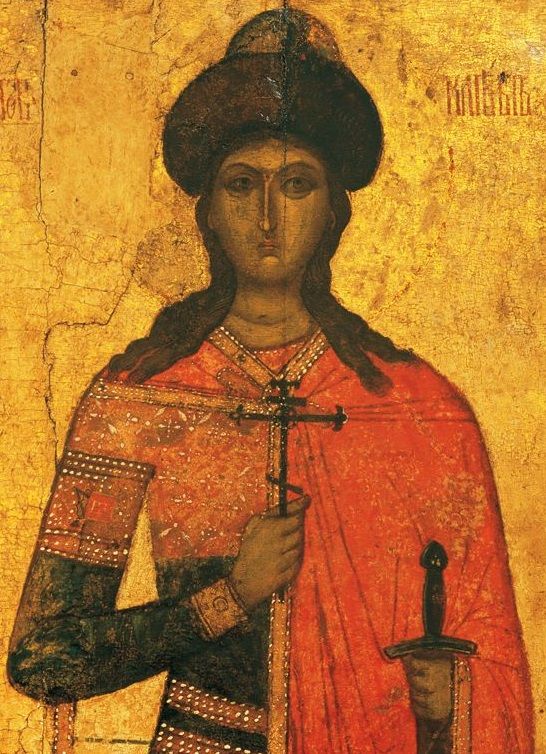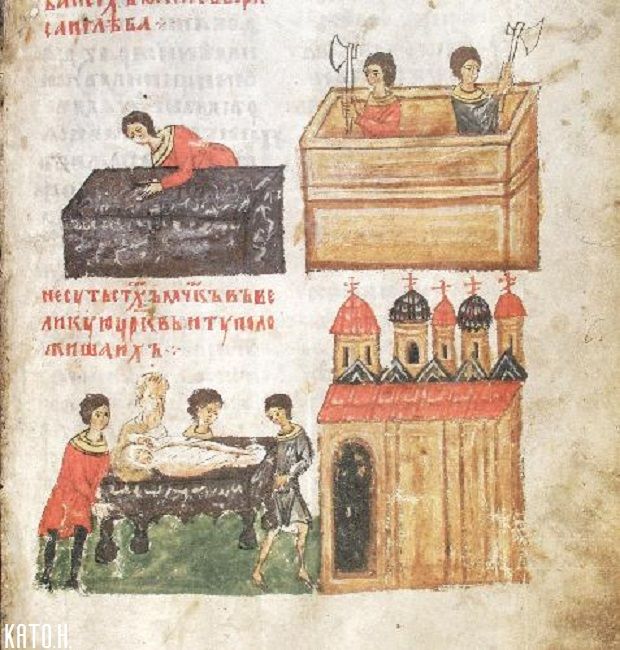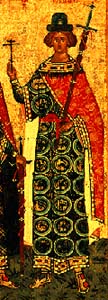Boris and Gleb were the first saints of Kievan Rus after the Baptism of Rus by Saint Vladimir, the grand prince of Kiev who converted the land to Christianity in 988.
According to 11th century book the Lives of Boris and Gleb (by Nestor the Chronicler and Jacob the Monk), they were children of Vladimir the Great, who loved them more than his other children.
Both were murdered during the internecine wars of 1015-1019, and their remnants were said to perform miracles. Both were canonized by Russian Orthodox church in Rus in 1071. They were interred at the Vyshhorod Cathedral, which was later named after them.
The two princes were used as an example to canonize emperor Nikolay II and his family in 2000. According to metropolitan Uvenaly Russian theological literature started using the word "horrorbearers" after Boris and Gleb and is applicable to those of the Russian saints that like Jesus Christ underwent physical and moral tortures followed by death from their political rivals.
The Primary Chronicle says that their mother was Bulgarian. Most modern scholars, however, argue that Boris and Gleb had different mothers, and were of different ages. Boris, who had been already married and ruled the town of Rostov Veliky, was probably regarded as heir apparent to the Kievan throne. Gleb, who was still a minor, ruled the easternmost town of Murom.
class="divider">∼Saint Gleb
Also known as
Glev
Memorial
24 July
Profile
Son of Saint Vladimir of Kiev and Anne of Constantinople, Duke of Muscovy. Brother of Saint Boris; great-grandson of Saint Olga.
After Vladimir's death, the kingdom was to have been divided among his sons, but their eldest half-brother, Svyatopolk, wished to rule alone. An army gathered to defend Boris, but he called them off, explaining that he could not raise a hand against his brother; Boris was soon killed by Svyatopolk's followers. Svyatopolk invited Gleb to Kiev, but on the way, his boat was boarded on the Dnieper River near Smolensk, and he was killed. In 1020, another of Vladimir's sons, Yaroslav, usurped Svyatopolk, and then buried the bodies of Boris and Gleb in the church of Saint Basil at Vyshgorod. Miracles were reported at their tomb, and it became a site of pilgrimage.
From the first, the highest motives were attributed to the brothers' resignation - unwillingness to repel injustice to themselves by force and violently oppose an elder brother. Not martyrs in the traditional sense, the Russian Church perceived them as "passion bearers" - blameless men who did not wish to die but refused to defend themselves, thus voluntarily submitting to death like Christ.
Died
1010-1015 (sources vary), stabbed in the throat
Canonized in
1724 by Pope Benedict XIII (cultus confirmed)
Patronage
princes
Boris and Gleb were the first saints of Kievan Rus after the Baptism of Rus by Saint Vladimir, the grand prince of Kiev who converted the land to Christianity in 988.
According to 11th century book the Lives of Boris and Gleb (by Nestor the Chronicler and Jacob the Monk), they were children of Vladimir the Great, who loved them more than his other children.
Both were murdered during the internecine wars of 1015-1019, and their remnants were said to perform miracles. Both were canonized by Russian Orthodox church in Rus in 1071. They were interred at the Vyshhorod Cathedral, which was later named after them.
The two princes were used as an example to canonize emperor Nikolay II and his family in 2000. According to metropolitan Uvenaly Russian theological literature started using the word "horrorbearers" after Boris and Gleb and is applicable to those of the Russian saints that like Jesus Christ underwent physical and moral tortures followed by death from their political rivals.
The Primary Chronicle says that their mother was Bulgarian. Most modern scholars, however, argue that Boris and Gleb had different mothers, and were of different ages. Boris, who had been already married and ruled the town of Rostov Veliky, was probably regarded as heir apparent to the Kievan throne. Gleb, who was still a minor, ruled the easternmost town of Murom.
class="divider">∼Saint Gleb
Also known as
Glev
Memorial
24 July
Profile
Son of Saint Vladimir of Kiev and Anne of Constantinople, Duke of Muscovy. Brother of Saint Boris; great-grandson of Saint Olga.
After Vladimir's death, the kingdom was to have been divided among his sons, but their eldest half-brother, Svyatopolk, wished to rule alone. An army gathered to defend Boris, but he called them off, explaining that he could not raise a hand against his brother; Boris was soon killed by Svyatopolk's followers. Svyatopolk invited Gleb to Kiev, but on the way, his boat was boarded on the Dnieper River near Smolensk, and he was killed. In 1020, another of Vladimir's sons, Yaroslav, usurped Svyatopolk, and then buried the bodies of Boris and Gleb in the church of Saint Basil at Vyshgorod. Miracles were reported at their tomb, and it became a site of pilgrimage.
From the first, the highest motives were attributed to the brothers' resignation - unwillingness to repel injustice to themselves by force and violently oppose an elder brother. Not martyrs in the traditional sense, the Russian Church perceived them as "passion bearers" - blameless men who did not wish to die but refused to defend themselves, thus voluntarily submitting to death like Christ.
Died
1010-1015 (sources vary), stabbed in the throat
Canonized in
1724 by Pope Benedict XIII (cultus confirmed)
Patronage
princes
Family Members
Advertisement
Advertisement













